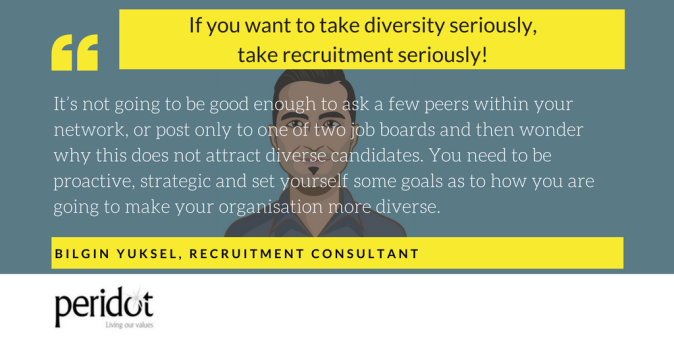No single action will solve the problem of a lack of diversity in our sector. But by taking recruitment seriously we can at least start to reduce the diversity deficit, says Bill Yuksel.

As a recruiter, with a background in senior leadership, and defined as BAME and disabled, I have had enough of the statement “We are committed to equality and diversity”.
It’s a statement used far too often, with little challenge, and often very little evidence to back it up.
If you are serious about equality and diversity, I encourage you to take two small actions:
1) Ask two simple questions:
- Are you really committed to equality and diversity?
- If so, how do you demonstrate it?
If you hesitate to answer either of those questions, you could do more. I ask these questions when I am considering joining a charity or working with them; I don’t think they are unreasonable or difficult. I also don’t expect someone to be able to recite everything they do, I’d just like an example of something. By providing an example, I can at least be sure that a level of sincerity is beneath the statement.
If you have examples of good practice, be proud and showcase them with passion. Equality statements have a place – and I would never advocate for their removal – but why not combine them with the ways in which your organisation is delivering on equality?
2) Take a look around you:
- Is there diversity in the membership of your board and staff teams?
- If not, why?
Having a specific reason why you currently lack diversity could be an acceptable answer, providing that you are working toward improving it. However, if you lack diversity and have no desire to improve the mix of individuals involved in your organisation, how can you be committed to equality and diversity?
Why I feel an effective recruitment strategy is essential
Charities need to be representative of the people, communities and causes they represent. We live in a multicultural and diverse society that faces unique complex, dynamic issues. My own experience serving on diverse boards is that the diversity added immense value to our ability to respond effectively to those issues facing our charities (a students’ association and university, both responsible for thousands of students) and understand our members better. Yet so many charities, many of whom represent large groups of society, lack diversity in key strategic and decision-making positions.
I understand that many of the issues around improving diversity are intersectional and no single thing will solve the problem. However, I can’t help but feel that by taking recruitment seriously we could at least start to reduce the diversity deficit. This is a feeling which is compounded when you see that more than nine out of 10 of charities still recruit trustees by word of mouth which is often likely to result in new trustees who have similar backgrounds to those already on the board. As both a candidate applying to board roles, and a recruiter in the not for profit sector it can often feel like many charities are giving superficial treatment to diversity, and few prioritise the investment of resources in delivering an effective and transparent recruitment process which could help them improve their diversity.
There is a wealth of diverse talent throughout the UK (as well as a wealth of diversity talent being missed, £24bn a year in the case of BAME talent) and charities need to ask how they are going to tap into it. Research shows that 90% of the people who are suitable for a role are often not looking for a new position, might not be aware of your vacancy, or simply had not been encouraged. As such I’d ask you to consider how you can possibly hope to attract a credible and diverse field of candidates without using a proactive strategy?
It’s not going to be good enough to ask a few peers within your network, or post only to one or two job boards and then wonder why this does not attract diverse candidates. You need to be proactive, strategic and set yourself some goals as to how you are going to make your organisation more diverse. As a starting point, I’d suggest that if you want to take diversity seriously, you need to take recruitment seriously.
Guest blog by Bill Yuksel, recruitment consultant at Peridot.